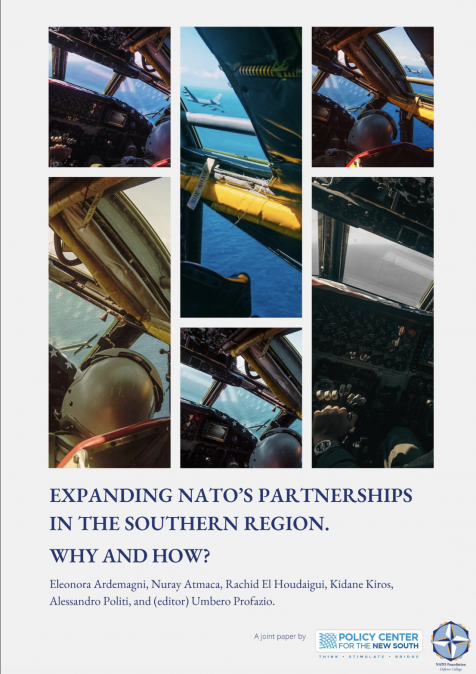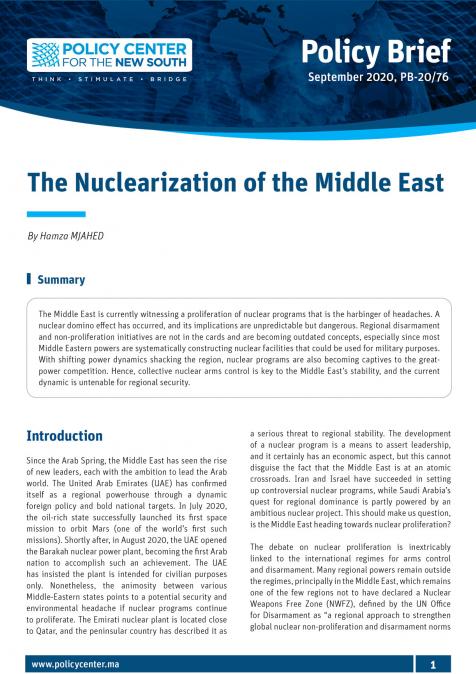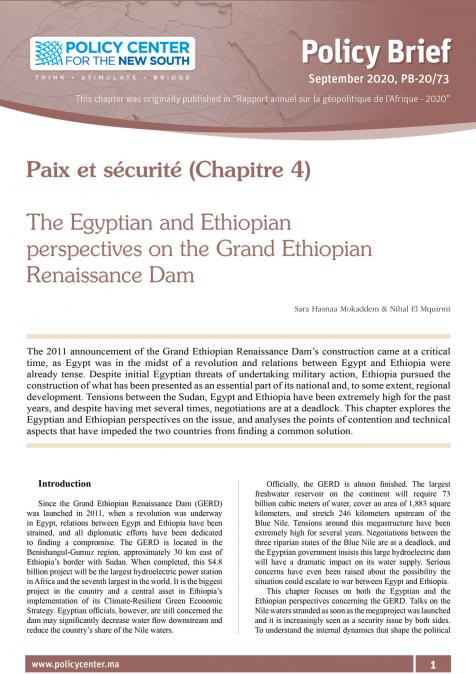Publications /
Opinion
On January 24, 2020, the Bana, a freighter, left the Turkish port of Mersin. Its destination was the Tunisian harbor of Gabes. It was a routine trip, until its transponder was deactivated and the ship disappeared from the radar. No mayday was received; the boat vanished like a ghost. Four days later a satellite observed three dots approaching Tripoli, Libya and when the images were enlarged, it became clear that the Bana was on a secret mission, since she was shadowed by two Turkish navy G-class frigates. At the end of March, the BBC broadcast the proof: videos, obviously recorded by a cell phone, documenting some of the cargo: tanks, jeeps with anti-tank guns, self-propelled howitzers.
Ankara did not react, even when sailors from the Bana confessed their cargo to the Carabinieri of Genoa, the frieghter’s next port of call. Protests were registered in New York, at the United Nations, which had assembled four days before the Bana reached its destination.
In Berlin, on January 19, 2020, the participants in an international peace conference on Libya, including UN Secretary General Antonio Guterres, Vladimir Putin, Emmanuel Macron, the African Union and Arab League, signed a resolution containing 55 points, including their pledge to stop arms exports to the region. Before he traveled to the German capital for the conference, Recep Tayyin Erdogan declared that his nation had become “a key to peace in Libya with its efforts both in the field and diplomacy,” and that “hope has sprouted” and the Berlin summit should not be sacrificed “to the ambitions of merchants of blood and chaos.”
Cynical Nod
The UN envoy in Libya, Ghassan Salamé, in a speech to the UN Security Council, switched from diplomatic moderation to furious outburst, railing against “unscrupulous actors” who promote peace and claim to support the UN “even as they double down on a military solution, raising the frightening specter of a full-scale conflict and further misery for the Libyan people”. Libya has six million citizens and has suffered 2,200 dead soldiers and civilians and 300,000 displaced people in this conflict. Turkey is not the only nation to have demonstrated its hypocrisy. Others are scrambling for power, oil, and gas, scheming with the internationally recognized Government of National Accord (GNA) in Tripoli, or the self-appointed Tobruk-based Field Marshal Khalifa Haftar, whose Libyan National Army (LNA) controls most regions of Libya and since April 2019 has attempted to conquer the capital, supported by countries including France, Russia, the UAE, Egypt, Jordan, and Saudi Arabia.
“France and Italy are key players and are competing with each other for leadership of international attempts to broker a political settlement in Libya”, according to a spring 2019 Chatham House study, ‘Instability in Libya. Assessing the regional impacts.’ “France is unique among European powers in that its strategic view of Libya is from the South, the Sahel and sub-Saharan Africa, rather than from the North. Unlike Italy, it prioritizes security and stabilization-related issues over those of migration. France is believed to have extensive engagement with the LNA. President Emmanuel Macron’s inclusion of LNA leader Haftar in French-sponsored talks in July 2017 and May 2018 offered Haftar legitimacy on the international stage and parity with the internationally recognized Prime Minister Fayez al- Serraj,” the report said. Italy’s priority in relation to Libya is containing irregular migration, the report noted.
Frustrated By the Lack of Willingness
The Chatham House report also analyzed Russian interests in the region: “Apart from political objectives and security ties, there are also commercial interests at play. Moscow had significant arms sales to the Gaddafi regime, so there is a drive to recover that lost market”.
Libya’s neighbors (Egypt, Sudan, Chad, Niger, Algeria, and Tunisia) have been directly impacted by security threats and instability. Libya has become an attractive environment for violent extremist groups, which aim to increase their influence in Libya and to use it as a base for strikes abroad. Libya is a transit station for irregular migration to Europe and a hub for the illegal arms trade. Human trafficking existed prior to the fall of the Gaddafi regime, which instrumentalized it as a means as gaining leverage over Europe (a strategy echoed by Turkey today in relation to Syrian refugees). Gaddafi’s message was clear, pay or Europe will turn ‘black’. Silvio Berlusconi, Italy’s then prime minister, paid up.
Now, there is no clear control over Libya’s smuggling networks. The Chatham House report concluded: “In a number of cases collusion has been alleged between coast guard units, armed groups, and smugglers, whereby the smuggler pays the armed group and the coast guard to allow his boats to pass, while those who don’t pay or are connected to rival groups are intercepted.” The migrant crisis—along with the broader civil war—has been “further abetted by a divided European Union, an ambivalent America, and active backing for Haftar by France, Russia and regional Arab States,” wrote Frederic Wehrey, a senior fellow at the Carnegie Endowment for International Peace.
Extortion, Intimidation and Abuse
The competition on the beaches, the control of detention centers, the sale of ‘slaves’, and the tactics of extortion, intimidation and abuse, reflect LNA tactics and methods used since 2016 by the Tripoli-based GNA government. The prime minister, Fayez al-Sarraj, depends on the acquiescence of several arms groups in Tripoli, and has minimal authority. Officially, al-Sarraj is recognized by the UN as the representative of the State of Libya. But in reality, Libya has two governments and its institutions are divided, including the central bank and the National Oil Corporation. Frederic Wehrey observed in Tripoli a war that “has been a strange, seemingly post-modern type of combat, waged until recently by all-seeing drones in the sky and hired guns on the ground.” It was “a war with very few warriors”, UN envoy Salamé said in a speech. But it is also a brutally human battle, fought by young Libyans who hurl insults at one another across the front lines, desecrate corpses and mistreat prisoners, just as soldiers have always done. Here, when death comes, it comes quickly and sometimes from the air, for fighters and civilians alike.”
Eager to offset the LNA’s weakness on the ground, reported Foreign Policy (March 18), the UAE carried out more than 900 air strikes in the greater Tripoli area in 2019 using Chinese combat drones, and, on occasion, French-made fighter jets. Turkey responded by deploying drones and Turkish officers to carry out roughly 250 strikes in order to halt the Haftar force’s advance. “Haftar”s latest offensive has possibly been one of the largest ever wartime deployments of armed drones, piloted on one side by personnel from the Emirates, and on the other by Turks,” observed Mr Wehrey. “Another clash between the two main camps is now brewing”, stated Foreign Policy, “and events in recent weeks suggested that the fighting will be more devastating than at any time before—and still may not produce a definite victory for either side”. The breakdown of Libya, the Chatham House study summarized, “has created dangerous ripple effects elsewhere; the ongoing instability and continued presence of fighters are of grave concern to regional players like Tunisia, Egypt and Algeria. The crisis in Libya also risks exacerbating existing conflicts in Libya’s southern neighbors, Sudan and Chad, as well as in the Sahel.”
The Wounding Of The Commander
In December 2019, a few thousand Turkish-backed Syrian mercenaries supposedly arrived in Tripoli, as part of a controversial maritime accord that grants Ankara gas-drilling rights in the Mediterranean in return for Turkish support against Haftar. To counter Turkey’s intervention, the pro-Haftar government in Eastern Libya formalized its alignment with the Syrian regime of Bashar al-Assad, according to Foreign Policy. A few hundred Syrian contractors hired from Assad militias are now reportedly in Libya on Haftar’s side.
Russia has sent to Libya a few thousand mercenaries from the paramilitary Wagner Group. In October 2019, at least 35 Russian mercenaries were killed fighting for Haftar’s forces, and a senior commander of the Wagner Group, Alexander Kuznetsov, was wounded in a battle in the south. Some of the Wagner Group fighters were recently transferred from Syria’s Idlib. Their toughness, sophisticated equipment and coordination has enabled the LNA to slowly grab parts of Tripoli’s outskirts. The UAE is a considerable backer for Haftar, a former Gaddafi general and CIA contact, who lived for about two decades in the United States before returning to Libya in 2011. He developed his power base by fighting a cruel war against jihadists, and political opponents in the violence-wracked city of Benghazi. Since January 12, 2020, the UAE has flown more than a hundred cargo planes into Libya (or to western Egypt, near the border), delivering 6200 tons of weapons, possibly in preparation for a new offensive aimed to deliver total victory.
US policy in Libya appears non-committal under Donald Trump, except when it comes to fighting Islamic State, attacking the hideouts of Caliphate remnants from the air, or condemning the Russian presence. Further fighting seems inevitable. There should be no shortage of weapons. The Bana, loaded with destructive cargo on its secret voyage, was just one pawn in a global power play, a dot as seen by a satellite in space.
The opinions expressed in this article belong to the author











